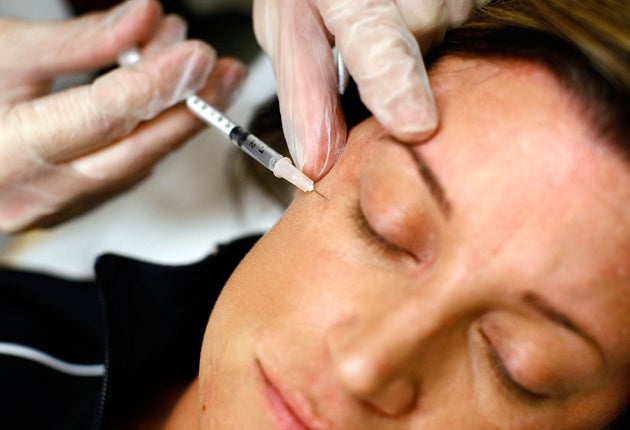Botox clinics told to tighten up on safety
Rogue practitioners face crackdown but charities say self-regulation is not enough

Your support helps us to tell the story
From reproductive rights to climate change to Big Tech, The Independent is on the ground when the story is developing. Whether it's investigating the financials of Elon Musk's pro-Trump PAC or producing our latest documentary, 'The A Word', which shines a light on the American women fighting for reproductive rights, we know how important it is to parse out the facts from the messaging.
At such a critical moment in US history, we need reporters on the ground. Your donation allows us to keep sending journalists to speak to both sides of the story.
The Independent is trusted by Americans across the entire political spectrum. And unlike many other quality news outlets, we choose not to lock Americans out of our reporting and analysis with paywalls. We believe quality journalism should be available to everyone, paid for by those who can afford it.
Your support makes all the difference.Beauty parlours and clinics providing Botox treatments and "filler" injections to plump up lips or smooth sagging skin are to be controlled for the first time in an attempt to drive out "rogue" practitioners.
Only doctors, dentists and nurses will be invited to apply for registration, which will allow them to present a certificate of approval to prospective patients as evidence of the safety and quality of their service. Organisations that provide the service will also be able to apply.
But the voluntary system was attacked yesterday for not going far enough. The charity Action against Medical Accidents said the Government's refusal to bring in statutory regulation would leave people at risk.
Which?, the consumer magazine, said it was "disappointing" that the Government had decided to "bottle out" and "leave it to the cosmetic treatments industry to make itself safe".
Demand for cosmetic treatment has soared in recent years and there are now an estimated 5,000 clinics carrying out an estimated 200,000 Botox and filler treatments a year in the UK.
Major cosmetic surgery is regulated, but non-surgical treatments such as Botox and filler injections can be offered by any high street business.
The dangers were highlighted by the actress Leslie Ash, star of the sitcom Men Behaving Badly, who had collagen implants in her lips in 2003 which went wrong, leaving her with a "trout pout".
Two government reports published in 2005 drew attention to the risk of the procedures. At the launch of the reports, the Chief Medical Officer Sir Liam Donaldson said aesthetic fillers injected under the skin used material from animals, birds and human corpses which could be infected with hepatitis and other viruses.
Yesterday, Andrew Vallance-Owen, chairman of the regulatory scheme established by the Independent Healthcare Advisory Service, said: "This is excellent news for the consumer and properly qualified practitioners. With an estimated growth of 25 per cent in treatments last year alone, the industry and the Department of Health recognised the need to safeguard patients by creating a system of registration and certification."
Two years ago, Dr Vallance-Owen said he regretted the Government's refusal to bring in statutory control but had accepted the task of establishing the self-policing scheme because "some regulation is better than none".
He said at the time it was very hard to work out how many people were being treated and how many were suffering adverse effects. "Occasionally you read of a celebrity who has been injured ... But there may be a lot of people who are embarrassed by what has happened or don't want to make a fuss and we don't hear about them."
Peter Walsh, chief executive of Action against Medical Accidents, said: "More and more people are being harmed by unregulated cosmetic treatment each year. We are disappointed that the Government has refused to bring these treatments under statutory regulation, but we will be using our experience and influence to make this scheme as robust as it can be."
Join our commenting forum
Join thought-provoking conversations, follow other Independent readers and see their replies
Comments